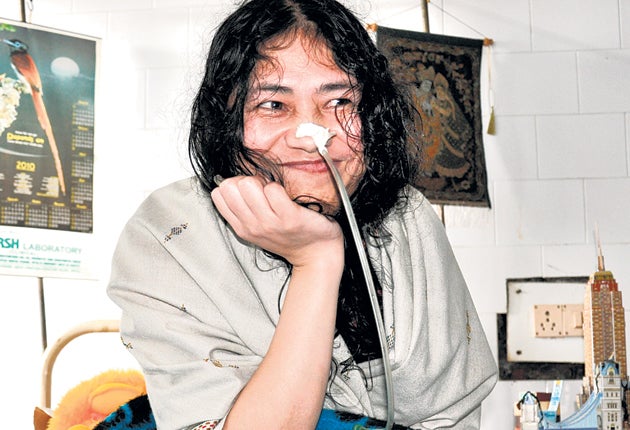Hunger striker's declaration of love angers her supporters

The world's longest-serving hunger striker has sparked controversy among her supporters by talking openly of her love for her British boyfriend and declaring her intention to marry him once she has finished her unprecedented fast.
Irom Sharmila, who has been force-fed since 2000 when she started protesting about the conditions in Manipur state in north-east India, told an Indian newspaper that though she was in love with the man, her supporters were opposed to the relationship.
"The man I love is waiting for me impatiently. He came here to meet me but my supporters refused that idea," she told the Calcutta Telegraph, from her bed in the security wing of the JN Hospital in Imphal. "He is of Goan origin but a British citizen. That is why they are against the relationship."
Ms Sharmila, 39, added: "They don't like to appreciate our relationship. They are also very possessive, very mean, very one-sided." Her supporters seized on the interview, claiming the newspaper had focused on the relationship rather than her struggle against the Armed Forces Special Powers Act (AFSPA), which campaigners say provides impunity to security forces in the north-east, where there is a history of insurgency. It organised a boycott of the newspaper and burned copies.
The relationship between Ms Sharmila and Desmond Coutinho, 48, a human rights activist, is an intriguing footnote to the story of a hunger-strike that has lasted for more than 10 years. When The Independent interviewed Ms Sharmila last year, she coyly referred to her boyfriend and pointed to a carving he had sent her.
It transpired the couple had corresponded by letter and have met only once, earlier this year, when he attended one of the hearings she regularly attends with a magistrate. In an email, Mr Coutinho confirmed the "long romantic story". He added: "We will marry when she is freed. She now wears my [flowers] on a chain [of] gold."
Babloo Loitongbam, a human rights campaigner from Manipur, said Ms Sharmila's supporters were not opposed to her having a relationship, but believed that her family and associates should also be given access to her.
"It's very clear she has the right to have a relationship. She has the right to choose a spouse. But she also has the right to be in touch with activists and her family," he said.
The cause of Ms Sharmila, who is force-fed by a tube twice a day, has received some additional publicity following the recent fast by anti-corruption campaigner Anna Hazare. Earlier this summer, the Indian government buckled to Mr Hazare's campaign for the establishment of an anti-corruption ombudsman after he went without food for 12 days.
Mr Hazare and his senior team are now planning a tour around various parts of India. Mr Loitongbam said he had spoken with members of Mr Hazare's group and said two of them intended to travel to Manipur.
Ms Sharmila began her campaign following the shooting by paramilitaries of 10 people standing at a bus stop. No one has ever been held accountable. Campaigners say that every year, scores and even hundreds of people are killed by the security forces in the state.
Nil by mouth: Surviving without food
* A person can survive for up to 60 days without food, but they can last only 10 days without both food and water.
* In the first three days, the body lives off its stores of glucose. After that, the liver begins ketosis (breaking down the body's fat stores) and the person will begin to appear to waste away. Each individual reacts differently under this physical stress, but after about three weeks they will usually enter the starvation phase – when their body begins withdrawing fat reserves from vital organs. At this stage, death is imminent.
* Irom Sharmila's hunger strike is treated as a crime. She is force-fed a liquid mixture of carbohydrates and proteins through a tube twice a day. This has kept her alive for 11 years despite no food or water passing her mouth, but she is thin, pale, weak, her menstrual cycle stopped and her muscles have wasted away, partly because she is not permitted to exercise outside.
Subscribe to Independent Premium to bookmark this article
Want to bookmark your favourite articles and stories to read or reference later? Start your Independent Premium subscription today.

Join our commenting forum
Join thought-provoking conversations, follow other Independent readers and see their replies